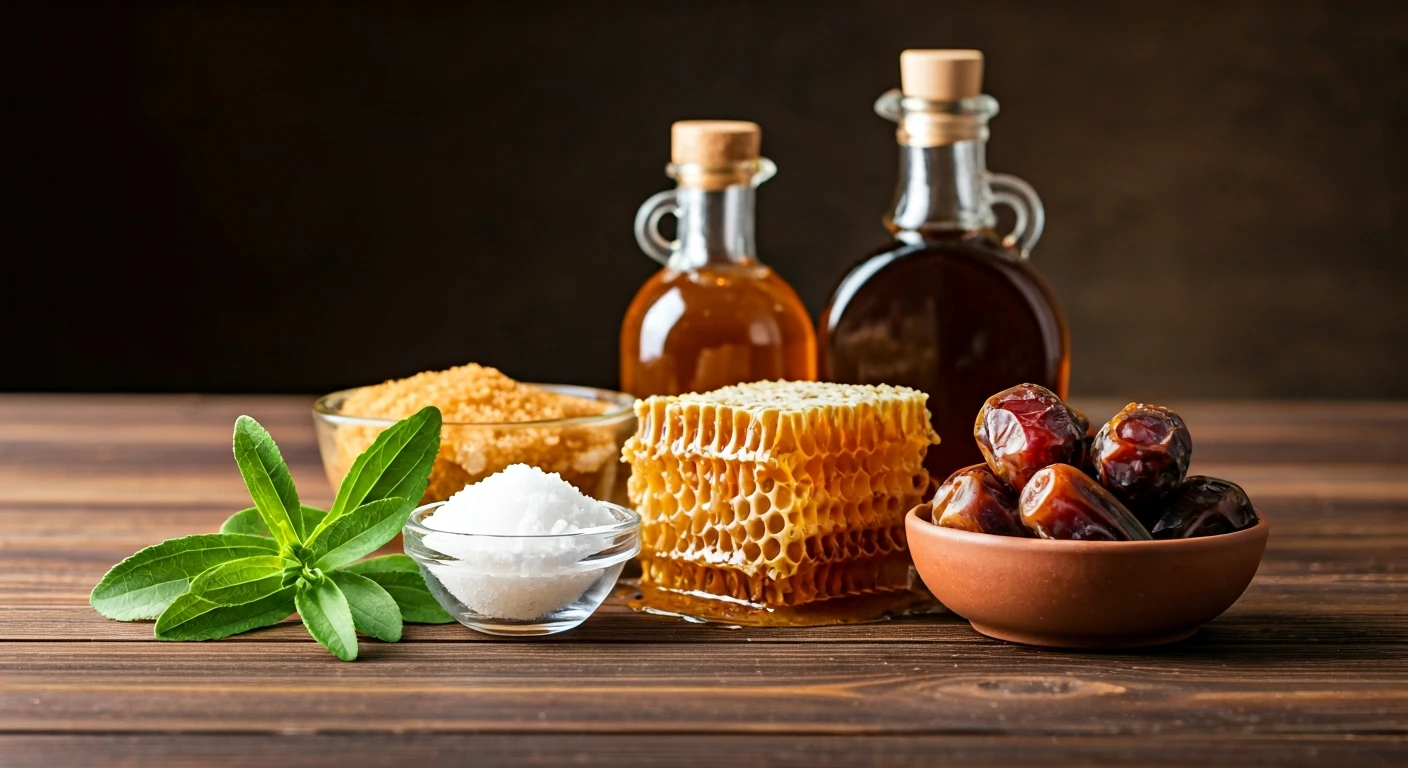Stevia: Nature's Sweetener
Stevia, a sweetener derived from the stevia plant, is celebrated for its remarkable sweetness without the calorie load. This makes it a popular choice
for those wanting to manage their weight or blood sugar levels, which is a significant factor in diabetes prevention. It offers a sugar-free solution and is often used in beverages, baked goods, and other foods. The intense sweetness of stevia means that you need only a tiny amount to achieve the desired level of sweetness. It's important to choose stevia products carefully, as some may contain added ingredients. Stevia has a unique, slightly licorice-like aftertaste, which may take some getting used to for some consumers. The plant's use dates back centuries, and is now commercially grown and used worldwide. Stevia's popularity continues to grow as more people look for natural, zero-calorie options.
Maple Syrup's Golden Goodness
Maple syrup, especially the pure variety, is another option, packed with natural sweetness and trace minerals. Unlike refined sugars, maple syrup contains antioxidants, which are beneficial for overall health. It's often graded based on color and flavor, with darker grades offering a more intense maple taste. While maple syrup is considered a better alternative to refined sugar, it still contains calories and impacts blood sugar levels, albeit generally to a lesser degree than white sugar. Therefore, it's wise to use it in moderation as part of a balanced diet. Its versatility makes it suitable for pancakes, waffles, or as a natural sweetener in various recipes. Maple syrup is a natural product of the maple tree, harvested in the spring and processed into the syrupy liquid we know and love.
Coconut Sugar's Tropical Touch
Coconut sugar is another sweetener option, derived from the sap of the coconut palm tree. It has a caramel-like flavor that makes it a popular choice in baking and cooking. It is a source of inulin, a type of fiber that can help slow down glucose absorption, which is something people with diabetes should keep in mind. Coconut sugar does have a lower glycemic index (GI) compared to regular white sugar, which means it may not cause such drastic spikes in blood sugar. Although it is lower GI, it is still a sugar, and portion control is important. The taste is quite unique, with subtle notes of caramel. It can replace regular sugar in most recipes, making it a good swap for those seeking a less processed option. It is a natural product and does not undergo much processing.
Honey: A Golden Treat
Honey, a natural sweetener created by bees, is enjoyed globally for its distinctive taste and potential health benefits. Raw honey contains trace amounts of vitamins, minerals, and antioxidants, unlike refined sugars. The composition of honey includes fructose and glucose, which affects blood sugar differently than sucrose. Because it is sweeter than sugar, you need less of it to get the same sweetness, but it still contributes to calorie intake. Honey's versatility extends to various culinary applications, from sweetening tea to glazing meats. Honey is also known for its antibacterial properties. However, it's crucial to consume honey in moderation, because it still impacts blood glucose levels. The origin and processing of honey can greatly impact its quality and nutritional profile.
Monk Fruit's Sweet Secret
Monk fruit sweetener, derived from the monk fruit plant, provides sweetness without any calories, making it a viable alternative for diabetes management. It's created by extracting compounds called mogrosides from the fruit, which are naturally sweet. Unlike some other sweeteners, monk fruit sweetener does not affect blood sugar levels, giving it an advantage for people trying to control their sugar intake. It's available in liquid and powdered forms. Monk fruit sweetener does not have a distinct flavor. It is a safe option for many people, and is gaining popularity as a sugar substitute. The plant itself is native to Asia and has a long history of use. When choosing a monk fruit sweetener, it’s worth checking the ingredient list to ensure it is pure and free from additives.
Blackstrap Molasses' Benefits
Blackstrap molasses, a byproduct of the sugar refining process, offers a robust flavor and some nutritional benefits. It is rich in minerals such as iron, calcium, and magnesium. It has a lower glycemic index (GI) compared to refined sugar, but, because it is a sugar, it still impacts blood sugar levels. Due to its intense flavor, it's typically used in smaller quantities. It can be added to gingerbread or used in savory sauces, giving depth of flavor. People often include blackstrap molasses as part of their health regimen. Molasses is a great source of minerals and nutrients, making it a better option compared to refined sugar. When looking to include blackstrap molasses in your diet, consider its strong taste and the added benefits it offers.
Jaggery: Traditional Sweetness
Jaggery, a traditional sweetener in India, is made from unrefined cane sugar or palm sap. It is often enjoyed as a healthier alternative to refined sugar. It’s also known for containing trace amounts of minerals and antioxidants. The processing is minimal, preserving some of the natural nutrients. Jaggery has a lower GI compared to white sugar. It still affects blood sugar and is to be consumed in moderation. The taste can vary depending on the source. It is very popular in traditional sweets and drinks in some regions. When choosing jaggery, look for unrefined varieties to maximize its health benefits. It's a natural option that is still considered a sugar, hence, portion control is crucial for anyone with diabetes. It is a good source of energy as well.




















